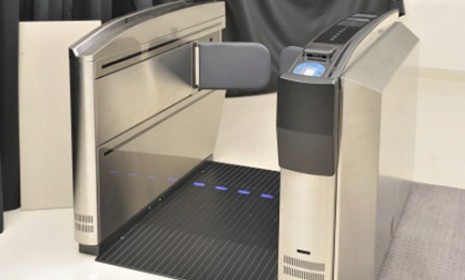The airport boarding gate that instantly detects explosives
Flying could become a little safer if Japan's new bomb-sniffing technology takes off

A free daily email with the biggest news stories of the day – and the best features from TheWeek.com
You are now subscribed
Your newsletter sign-up was successful
The efficacy of current airport security measures — which require travelers to clumsily remove their shoes, belts, and more in the name of safety — is understandably debatable. To address some of the issues with trying to keep air travel safe, electronics company Hitachi, together with researchers at the University of Yamanachi, have developed a tangible solution that seamlessly sniffs out airplane-destroying bombs when you scan your ticket at the boarding gate. Here, a concise guide:
Why at the boarding gate?
Japanese researchers claim that flight safety could be "drastically increased" if passengers were searched one last time before boarding, says Andrew Liszewski at Gizmodo. But such a solution would require X-rays, metal detectors, and additional support staff, bogging down passengers and causing further delays. Enter Hitachi's new high-speed explosive-detecting technology, which the company says will make flying even safer without slowing the process down.
The Week
Escape your echo chamber. Get the facts behind the news, plus analysis from multiple perspectives.

Sign up for The Week's Free Newsletters
From our morning news briefing to a weekly Good News Newsletter, get the best of The Week delivered directly to your inbox.
From our morning news briefing to a weekly Good News Newsletter, get the best of The Week delivered directly to your inbox.
How does it work?
The prototype security gate can find even the most microscopic evidence of explosive material quickly and efficiently within one or two seconds. When passengers swipe their boarding pass or smartphone, a process called high-sensitivity mass spectrometry takes place. (See the device in action below.) A tiny gust of air will be blown towards the hand and is subsequently sucked back into the machine, where computers can detect even the faintest hint of combustive particles.
How efficient is the machine?
If all goes according to plan, the new system "could check up to 1,200 passengers every hour at a single gate," says Jon Fingas at Engadget. That's a rate quick enough to prevent logjams at even the busiest airport terminals. The next step is to actually begin testing the technology, and trial installations are underway at Narita International Airport and a Tokyo subway station beginning this spring.
A free daily email with the biggest news stories of the day – and the best features from TheWeek.com
-
 Political cartoons for February 6
Political cartoons for February 6Cartoons Friday’s political cartoons include Washington Post layoffs, no surprises, and more
-
 Trump links funding to name on Penn Station
Trump links funding to name on Penn StationSpeed Read Trump “can restart the funding with a snap of his fingers,” a Schumer insider said
-
 US, Russia restart military dialogue as treaty ends
US, Russia restart military dialogue as treaty endsSpeed Read New START was the last remaining nuclear arms treaty between the countries